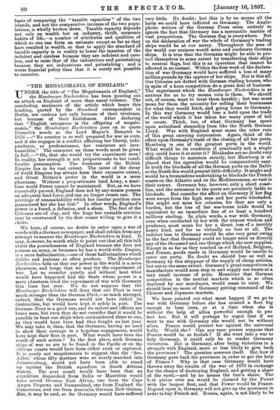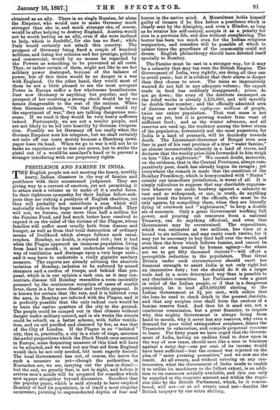"THE MEGALOMANIA OF ENGLAND."
'UNDER the title of "The Megalomania of England," the Hamburger Nachrichten has been pouring out an attack on England of more than usual violence. The concluding sentences of the article which bears this heading, quoted by the Standard correspondent in Berlin, are curious not only because of their virulence, but because of their foolishness. After declaring that "English arrogance is the offspring of megalo- mania," the Hamburger Nachrichten goes on to quote Disraeli's words at the Lord Mayor's Banquet in 1876 :—" No country is so well prepared for war as ours, and if she engages in a conflict affecting her liberty, inde- pendence, or predominance, her resources are inex- haustible." The comment on these words must be given in full :—" Oh, that she would try the experiment soon ! In reality, her strength is not proportionate to her insuf- ferable presumption. The weakness of the British Empire lies in its vast extent. The cause of the decay of world Empires has always been their excessive extent, and Great Britain's power in the world is a mere phantasm. Without a proportionate land Army, a mari- time world Power cannot be maintained. But, as we have repeatedly proved, England does not by any means possess an adequate land force, and can no longer create one. The privilege of unassailability which her insular position once guaranteed her she has lost." In other words, England's power is a fraud, a delusion, and a sham. The feet of the Colossus are of clay, and the huge but unstable erection may be overturned by the first, corner willing to give it a shove.
We have, of course, no desire to enter upon a war of words with a German newspaper, and shall refrain from any attempt to answer the Hamburger Nachrichten in kind. It may, however, be worth while to point out that all this talk about the powerlessness of England because she does not possess an army, or bemuses he has a world-wide Empire, is a mere hallucination,—one of those hallucinations which dislike and jealousy so often produce. The Hamburger Nachrichten tells us that our power in the world is a mere phantasm, and longs that we may try the experiment of war. Let us consider quietly and without heat what would have happened had the State whose power is a mere phantasm tried the experiment of war with Germany this time last year. We do not suppose that the Hamburger Nachrichten will deny that our Fleet is very much stronger than the German Fleet,—so much stronger, indeed, that the Germans would not have risked its destruction, but would have kept it safely in port. The German Navy is a good one, and its sailors and officers are brave men, but even they do not consider that it would be possible to beat our ships when outnumbered three to one, as they would have been had they fought us last year. We may take it, then, that the Germans, having no need to show their courage in a hopeless engagement, would have kept their fleet in port. What would have been the result of such action ? In the first place, such German ships of war as are to be found in the Pacific or on the African coasts would have been either sunk or captured. It is surely not megalomania to suggest that the See- Adler,' whose fifty marines were so nearly marched into Johannesburg, would not have been able to stand up against the British squadron in South African waters. The next result would have been that an expedition despatched from India or Mauritius would have seized German East Africa, one from the Cape Angra Pequena and Darnaraland, one from England the • Cameroons, and one from Australia German New Guinea. But, it may be said, so far Germany would have suffered very little. No doubt ; but this is by no means all the harm we could have inflicted on Germany. The Anglo- phobe writers of the German Press seem entirely to ignore the fact that Germany has a mercantile marine of vast proportions. The German flag is everywhere. But on the declaration of war the whole of Germany's trading ships would be at our mercy. Throughout the seas of the world our cruisers would seize and confiscate German ships. It is true that the Germans might be able to pro- tect themselves to some extent by transferring their ships to neutral flags, but this is an operation that cannot be effected in an instant. Within the first week of the declara- tion of war Germany would have suffered a loss of many million pounds by the capture of her ships. Nor is this all. Our Colonies are dotted with German trading houses, who in spite of a keen competition do a great deal of business. The experiment which the Hamburger Nachrichten is so anxious for us to try means ruin to them. We should not, of course, want to treat them harshly ; but war must mean for them the necessity for selling their businesses for what they would fetch, and going home to Germany. In this way Germany would lose a hold upon the trade of the world which it has taken her many years of toil to create. Think, too, of what Germany has spent upon subsidised steamship lines like the North German Lloyd. War with England must mean the utter ruin of this great carrying corporation. Again, think of the effect upon Germany's trade of the closing of all her ports. Hamburg is one of the greatest ports in the world. What would be its condition if practically not a single ship could leave it or enter it ? Blockades are no doubt very difficult things to maintain strictly, but Hamburg is so placed that the operation would be comparatively easy. In truth the blockade of all the German ports on the Baltic or the North Sea would present little difficulty. It might and would be a tremendous undertaking to blockade the French coasts on the Atlantic and on the Mediterranean, so vast is their extent. Germany has, however, only a short coast- line, and the entrances to the ports are peculiarly liable to blockade. But consider the effect on Germany if her flag were swept from the high seas and her ports blockaded. She might not miss her colonies, for they are only a burden, but the loss of her sea-borne trade would be equivalent to an immediate fine of at least a hundred millions sterling. In plain words, a war with Germany, even when conducted by her with the utmost wisdom and prudence, must mean for her a direct loss of a terribly heavy kind, and for us virtually no loss at all. The indirect loss to Germany would be also very great owing to the fact that Germany could no longer send us directly any of the thousand and one things which she now supplies. Except in so far as they reached us rid Holland, Belgium, and France, goods made in Germany would be unable to enter our ports. No doubt we should lose as well as Germany by this stoppage of the supply of cheap articles, but not to the same extent. Germany's great competitors in manufacture would soon step in and supply our wants at a very small increase of price. Meantime that German competition in the neutral markets which is so often deplored by our merchants, would cease to exist. We should hear no more of Germany getting command of the Chinese and Japanese markets.
We have pointed out what must happen if we go to war with Germany before she has created a fleet big enough to beat ours, or at a time when she is without the help of allies powerful enough to pro- tect her. But it will perhaps be urged that if we went to war with Germany she would not be without allies. France would protect her against the universal bully. Would she ? Can any sane person suppose that France would be so foolish ? If she went into a war to help Germany, it could only be to render Germany victorious. But is Germany, after being victorious in a struggle with England, more or less likely to give back the provinces ? The question answers itself. But how if Germany gave back the provinces in order to get the help of France ? Why in that case Germany would have thrown away the results of the war of 1870 in exchange for the chance of destroying England, and getting a share of the spoil,—and by no means the lion's share. The best pieces over sea would be claimed by the Power with the largest fleet, and that Power would be France. Depend upon it, Germany will not give up the provinces in order to buy French aid. Russia, again, is not likely to be obtained as an ally. There is no single Russis.n, let alone the Emperor, who would care to make Germany much stronger than she is, and much stronger she, of course, would be after helping to destroy England. Austria would not be worth having as an ally, even if she were inclined to help, which is doubtfu!, for she has no fleet ; while Italy would certainly not attack this country. The prospect of Germany being fined a couple of hundred millions, and losing her colonies and her prestige, political and commercial, would by no means be regarded by the Powers as something to be prevented at all costs. They, or rather certain of them, might not like to see her military power destroyed, beciase of the balance of power, but of this there would be no danger in a war with England. On the other hand, they would most of them be not a little pleased to see the most arrogant Power in Europe suffer a few wholesome humiliations. Just now Germany is anything but popular, and the prospect of her receiving a strong check would be by no means disagreeable to the rest of the nations. When then Germans exclaim, "Oh that England would try the experiment of war," they are talking dangerous non- sense. If we tried it they would be very heavy sufferers indeed. Fortunately, we are not a touchy people, and are not likely to be led into hostility by German vitupera- tion. Possibly we let Germany off too easily when the German Emperor sent his telegram, but we shall certainly not take off our coats merely because a Hamburg news- paper loses its head. When we go to war it will not be to make an experiment or to test our power, but to strike the pistol out of a would-be assailant's hand or to prevent a stranger interfering with our proprietary rights.







































 Previous page
Previous page